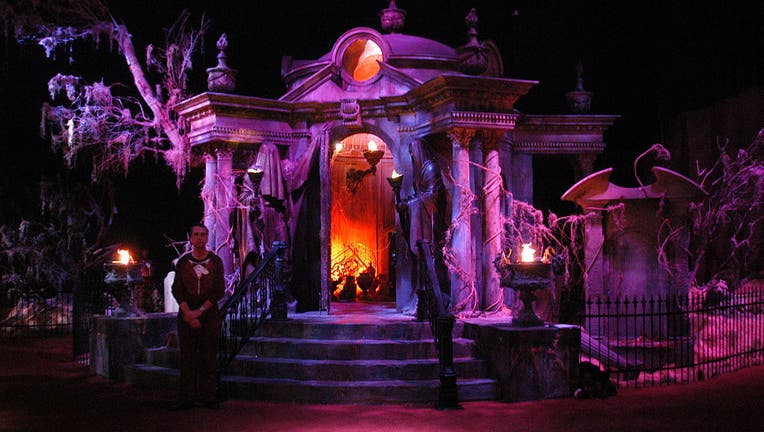Do you have to reveal your house is haunted before selling?

Atmosphere and Props and Sets from Disney's "The Haunted Mansion" Film at El Capitan Theatre "Haunted Mansion" Hollywood (Photo by Barry King/WireImage)
ATLANTA - Lots of factors can wreck your home sale: wrong price, bad decorating, poor marketing and postponed maintenance. But there is one condition that’s a sure show stopper: when the house you are trying to sell is a true "haunted house."
So, who ya gonna call? Well, we put out a call to our own Fox 5 Real Estate expert, John Adams to give us the facts.
Q: John, is this a joke? I mean, yes, it's Halloween, but is this a real thing in residential real estate?
A: Yes, it is a very real thing. And if your house is, in fact, "spook central," you’d better disclose that fact to a buyer in writing.
Georgia is a "caveat emptor" state, which means that buyers are responsible for doing their own due diligence on a property before purchasing it. Sellers are not required to disclose any information about the property that is readily observable to a buyer upon inspection.
So unless your apparition is visible and slimes the buyer during a visit to your home, it’s just smart to stipulate that it is, to the best of your knowledge, haunted.
However, there are some exceptions to this rule. For example, sellers are required to disclose any known material defects in the property, such as structural problems, mold, or water damage. Sellers must also disclose any known environmental hazards, such as lead paint or asbestos.
Q: So, what about haunted houses? Are sellers required to disclose that their house is haunted?
The answer is complicated.
There is no specific law in Georgia that requires sellers to disclose paranormal activity. However, there is a general rule that sellers must disclose any information that could negatively impact the value of the property.
This means that if a seller knows that their house is haunted and believes that this information could negatively affect the sale price, they should disclose it to the buyer in writing.
In fact, there have been a few cases in Georgia where buyers have sued sellers for failing to disclose paranormal activity.
In one case, a buyer sued a seller after discovering that the house they had purchased was haunted by a ghost. The buyer alleged that the seller had known about the ghost and had failed to disclose this information to them. The court ruled in favor of the buyer and awarded them damages.
So, while sellers are not legally required to disclose paranormal activity, it is generally a good idea to do so. If a buyer finds out after the sale that the house is haunted, they may be able to sue the seller for fraud.
Q: What should sellers do?
If you are selling a house in Georgia that you believe is haunted, there are a few things you can do to protect yourself:
- Disclose the paranormal activity to the buyer in writing. This could be done in the purchase agreement or in a separate disclosure statement.
- Be honest about the extent of the paranormal activity. If you have only heard rumors about the haunting, tell the buyer that. If you have seen goblins or been slimed yourself, tell the buyer about your experience.
- Offer the buyer the opportunity to have the house inspected for paranormal activity. Let them call in a psychic, a paranormal investigator, or even a religious leader.
- Be willing to negotiate the sale price. Some people may be willing to buy a haunted house for a reduced price.
Q: What should buyers do?
If you’re the buyer and you’re concerned that the house might be haunted:
- Ask the seller if they suspect or know about any paranormal activity in the house.
- Have the house inspected for paranormal activity by a psychic, a paranormal investigator, or a religious leader.
- Talk to the neighbors to see if they have experienced any paranormal activity.
- Be prepared to walk away from the sale if you are "spooked" at the ghosts & goblins in the house.
THE BOTTOM LINE:
The more a seller discloses to a buyer, the less likelihood there is of that seller getting sued later for fraud. But technically, sellers are not required to disclose suspected paranormal activity when selling a house in Georgia. My bottom line is this: it is generally a good idea for sellers to disclose any information that could affect the value of the property, including paranormal activity. Buyers should also be aware of the potential for paranormal activity in any house they are considering, and should take steps to protect themselves.
If your house is haunted, or if you even believe in ghosts, join the LIVE CHAT with John on the Fox5 Atlanta Facebook page for the next hour. John will answer all questions related to real estate, not just ghosts & goblins.
##########################################
Atlanta native John Adams has been a real estate broker and investor in residential real estate for the past four decades, and has seen the market go up and down and back up. He hosts "The Real Estate Coffee Break" every Saturday at 11am on the world wide web at www.RealEstateCoffeeBreak.com. John believes that, for most Americans, the best investment they will ever make is their own home.
John Adams will be here for the next hour to answer all your real estate questions on our Fox5 Atlanta Facebook Page. He is happy to field all real estate questions, not just those related to today’s topic.

